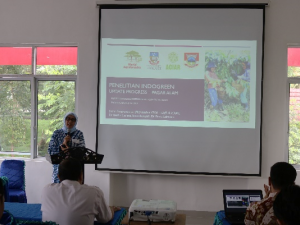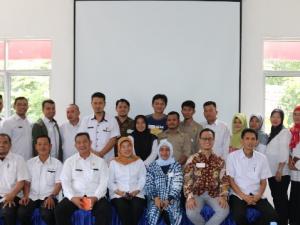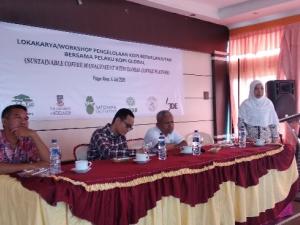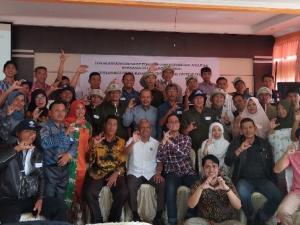Fieldwork stories from South Sumatra
Sacha Amaruzaman, a PhD candidate at the Centre for Global Food and Resources (CGFAR), shares latest updates about his research field work in South Sumatra, Indonesia.
IndoGreen – local government workshop
The IndoGreen project led by Centre for Global Food and Resources (CGFAR) has implemented its field activities for more than a year in Pagar Alam, Indonesia. In June, the project field team led by World Agroforestry Centre (ICRAF) conducted an annual workshop with the local government. The Planning Office of Pagar Alam hosted the workshop, while the officials from the Agricultural, Environmental, Food Security, and Forestry Offices joined the meeting.
In the opening, the Chief of Planning Office requested the team to provide the recommendation that is aligned with the new medium-term plan documents. The official planning document will need scientific inputs to improve the implementation for the next five years. In the first session, Sacha provided updates on the IndoGreen activities. The IndoGreen team in Pagar Alam has finished the in-depth interviews, focus group discussions and household survey of farmers.
Afterwards, Dr Beth Lusiana , the ecological modeller from the World Agroforestry Centre (ICRAF), elaborated the IndoGreen’s next activity to analyse the policy trade-offs in Pagar Alam through a socio-ecological model. This model will measure the economic and environmental trade-offs from different policies. The participants discussed within three small groups to explore the potential policy scenarios as the input for the trade-off model in Pagar Alam.
In her closing speech, Zaitun, the Mayor’s Advisor on Economic and Welfare conveyed further support from the local government for the IndoGreen activities. She looked forward to the IndoGreen results to inform the agricultural development and conservation activities in Pagar Alam.
Capacity Building Workshop for Coffee Farmers
On the 4th of July, the IndoGreen team organised a sustainable coffee workshop for the local farmers in Pagar Alam. This workshop was held through additional funding support from the Satoyama Development Mechanism, in collaboration with Empower-Nedcoffee, a capacity building program for farmers.
The workshop provided the opportunity to local stakeholders in Pagar Alam to hear from the global coffee players regarding sustainable coffee management and their expectation in working with the local smallholders.
Dr Surip Mawardi, a senior agronomist from Starbucks Farmers Support Centre, was the main resource person in the workshop. The other resource person, Mulustan, was the farmer from Semendo - the neighbouring district - that had been learning principles of sustainable coffee management from Dr Mawardi since 2015.
The key-persons from the Planning, Agricultural, and Forestry offices also joined the discussion with the champion farmers that IndoGreen has identified throughout the activities. Farmers from the Empower program as well as the representatives from the local Business Development Cooperative and Coffee Geographic Indicative Society also participated in the workshop.
Dr Mawardi started his talk by reminding that Arabika variety was the original coffee variety introduced in Basemah area of South Sumatra (Lahat-Pagar Alam-Semendo) by the Dutch. The Arabika variety in Basemah was gradually being replaced by Robusta and forgotten due to its vulnerability towards pest and disease.
Dr Mawardi also addressed the challenges and opportunities for smallholders in producing sustainable coffee. Not all of the areas in Pagar Alam are suitable for Arabika coffee. In this case, fine Robusta could be a sustainable alternative for improving farmers’ livelihood.
Fine Robusta coffee is generated through the more intensive coffee farming process, such as selective picking and post-harvest management. This differs from the traditional coffee farming that most farmers currently practice in Pagar Alam. Currently, there is no incentive for coffee farmers in Pagar Alam to produce fine robusta as they have very limited access to its market.
Afterwards, Mulustan shared his experience and perspectives on the benefits of practising sustainable coffee farming. Endri Martini, the researcher from World Agroforestry Centre (ICRAF) suggested combining the Arabika and improved Robusta in Pagar Alam. The combination of variety through agroforestry will help farmers to have more alternative livelihood options and help in reducing their vulnerability to shocks.
Sacha Amaruzaman is an Awardee of the Australian Awards and a Fellow at ICRAF Indonesia. The field activities were supported by IndoGreen project and Satoyama Development Mechanism Grant through his fellowship with ICRAF.
IndoGreen is an Australian Centre for International Agricultural Research (ACIAR) funded research project managed by CGFAR, focusing on the analysis of the agri-environmental policies that influence the uplands of Indonesia. The project is being undertaken in three upland areas of Indonesia: South Sumatra with World Agroforestry Centre (ICRAF), West Java with Indonesian Centre for Agricultural Socio-Economic and Policy Analysis (ICASEPS), and in Jambi with World Wide Fund for Nature (WWF).




